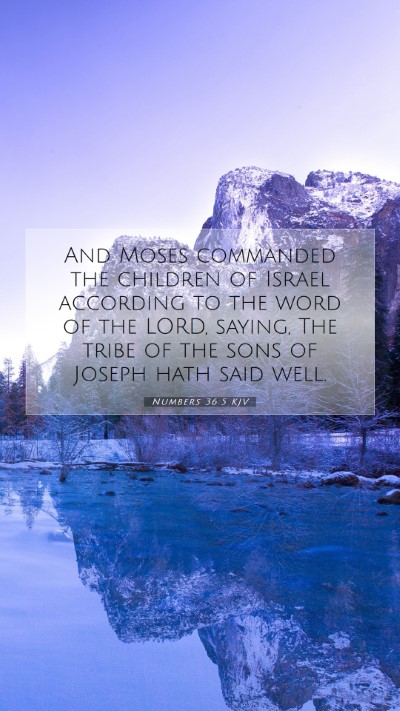Understanding Numbers 36:5
Verse: “And Moses commanded the children of Israel according to the word of the Lord, saying, The tribe of the sons of Joseph hath said well.”
Bible Verse Meanings
This pivotal verse summarizes a crucial decision made by Moses concerning the inheritance rights of the daughters of Zelophehad. The context involves discussions on how land should be distributed amongst the tribes of Israel, particularly regarding daughters inheriting their father's land if their father had no sons.
Scripture Analysis
According to Matthew Henry, Moses’ command highlights God’s concern for justice and equality. The daughters of Zelophehad sought to ensure their family inheritance would not be lost, demonstrating God’s provision for their rights. The verse serves to affirm that God's laws are for the protection of those who might be marginalized in society.
Albert Barnes provides further insights regarding the interplay between the tribes of Joseph (Ephraim and Manasseh) and Moses’ role as mediator. He emphasizes that the acknowledgment by Moses serves to validate the concerns raised by the tribe of Joseph and reflects God’s intentions for fair inheritance practices.
Adam Clarke adds that this instruction also carries implications about leadership and obedience. Moses acted not just on personal judgment, but on divine command, clarifying that God guides his people through leaders who are faithful in their discernment of His will.
Bible Verse Interpretations
In understanding this verse, we see an intersection of law, social justice, and divine authority. It is significant in the greater narrative of Numbers and the Israelite's journey to establishing their society in the Promised Land.
In-depth Bible Verse Analysis
- Legal Context: This verse exemplifies God's law regarding land inheritance, particularly addressing scenarios where traditional lines of inheritance are disrupted.
- Sociological Implications: The acceptance of women's rights to inheritance in this context indicates a progressive step toward gender equity in a largely patriarchal society.
- Theological Significance: The acknowledgment of the tribe of Joseph underscores God's thoroughness in ensuring that all voices are heard and represented in matters of His covenant.
Bible Study Insights
This verse serves as a valuable discussion point for Bible study groups exploring themes of justice, equity, and God's law. It invites reflection on how ancient laws can inform modern understanding of rights and responsibilities.
Historical Context of Bible Verses
Understanding the historical context of Numbers 36:5 is essential. During the time of Moses, the Israelites were transitioning from a nomadic lifestyle to settlement in Canaan. This shift required clear declarations regarding land ownership and the distribution among tribes and families, reflecting the evolving social structure.
Applying Bible Verses to Daily Life
The application of this verse can extend to discussions about how we treat issues of inheritance, rights, and justice today. It calls for Christians to seek fairness and inclusivity in their communities, drawing parallels to how God’s justice is to be reflected in human relationships.
Cross References
- Numbers 27:1-11 - The daughters of Zelophehad appeal for their rights.
- Deuteronomy 21:15-17 - Laws concerning inheritance and family rights.
- Joshua 17:3-6 - The allotment of land to the descendants of Joseph.
Conclusion
In summary, Numbers 36:5 is not merely a historical note; it exemplifies the depth of God's concern for justice within His community. It is a reminder of the importance of standing for what is right and how God's directives can guide equitable practices. For anyone seeking to delve deeper into scripture, this verse provides a great opportunity for Bible study lessons that connect ancient wisdom with contemporary issues.


